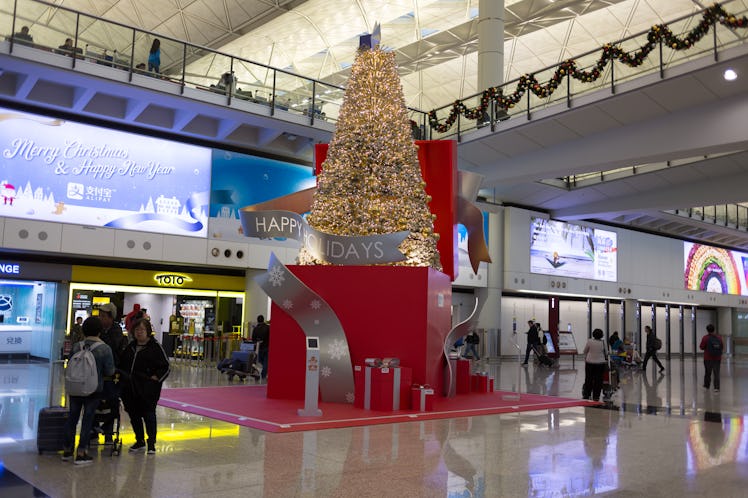
The Busiest Travel Days For The Holiday Season Will Have You Rethinking Your Plans
As the Christmas season approaches and U.S. coronavirus cases continue to rise, experts have advised against any non-essential holiday travel. Considering crowded airports — which will be hard to avoid — will make it more difficult to socially distance from others, the current advice is to stay home. So as you ponder holiday travel plans and consider the busiest travel days for Christmas, you may want to follow experts’ advice and rethink flying altogether.
It’s not the news anyone wants to hear, but as the pandemic rages on, holiday celebration guidance from the U.S. Centers for Disease Control and Prevention (CDC) as of Dec. 4 states the safest way to celebrate the holidays is to stay home. Experts are issuing even more dire warnings than they were at the beginning of the holiday season in November. Dr. John Swartzberg, M.D., F.A.C.P., clinical professor emeritus of infectious diseases and vaccinology at Berkeley Public Health, tells Elite Daily, "Unless it is an emergency, no one should be flying over Christmas or New Year's Eve or Day.” He adds, “It was dangerous to fly over Thanksgiving; it will be more dangerous over the coming holidays."
As you consider traveling, you should first look at which days will be the busiest. Christie Hudson, Senior PR Manager for Expedia, tells Elite Daily the busiest days to travel for Christmas, according to flight demand as of Dec. 9, are Saturday, Dec. 19 and Wednesday, Dec. 23. Scheduling a return flight may be a bit more flexible, but as of Dec. 9, the busiest booking day is Saturday, Dec. 26.
Thanksgiving saw big numbers, according to a Dec. 1 report from the Transportation Security Administration (TSA). More than 1 million airline passengers traveled over the four-day Thanksgiving holiday, and approximately 9.5 million passengers total traveled over a 10-day period. According to TSA spokesperson Dan Velez, TSA doesn't make passenger number predictions, but it’s likely Christmas travel won't reach the same numbers. Typically, the busiest Christmas travel days are the Thursday before the holiday, which is Dec. 17 this year, and the Sunday after New Year's Day (Jan. 3).
When warning against Thanksgiving travel in November, Dr. Swartzberg told Elite Daily, “This virus does not respect our holidays," adding, “If people need to travel by plane, train, or bus ... they could get infected during their travel.” He stressed the importance of opting for a virtual celebration over anything in-person, similar to the CDC’s guidance, which lists virtual celebrations as the lowest risk option and in-person gatherings with people outside of your immediate household as the highest risk option.
Rachael Piltch-Loeb, Ph.D., a preparedness fellow at Harvard University's T.H. Chan School of Public Health, previously told Elite Daily that travel “contributes to a higher risk situation.” If you must travel, Piltch-Loeb suggests doing so in off-peak times. Hudson notes the least busy travel days as of Dec. 9 are Christmas Eve (Thursday, Dec. 24), Christmas Day (Friday, Dec. 25), and New Year's Day (Friday, Jan. 1). Monday, Dec. 21 and Tuesday, Dec. 29 come in as the second least busy dates.
For anyone who must travel, Piltch-Loeb also suggests wearing a mask, implementing distancing where possible, and sanitizing your hands and airplane seat. Back in November, Piltch-Loeb told Elite Daily people should quarantine and get tested for COVID-19 before a trip, as well as get a flu shot.
When it comes down to it, it'll be hard to avoid busy travel days during the season, and the advice from the experts is that the best way to stay safe is to stay home.
If you can't make that happen, be sure to also follow the CDC's travel safety measures, which include wearing a face mask, practicing social distancing, washing or sanitizing your hands often, and staying home if you or someone you're traveling with is sick.
If you think you’re showing symptoms of coronavirus, which include fever, shortness of breath, and cough, call your doctor before going to get tested. If you’re anxious about the virus’s spread in your community, visit the CDC for up-to-date information and resources, or seek out mental health support. You can find all Elite Daily's coverage of coronavirus here.
Experts cited:
Dr. John Swartzberg, M.D., F.A.C.P., clinical professor emeritus at the UC Berkeley School of Public Health's Division of Infectious Diseases and Vaccinology
Rachael Piltch-Loeb, Ph.D., preparedness fellow at Harvard University's T.H. Chan School of Public Health
Keri Althoff, Ph.D., associate professor in the Department of Epidemiology at the Johns Hopkins Bloomberg School of Public Health